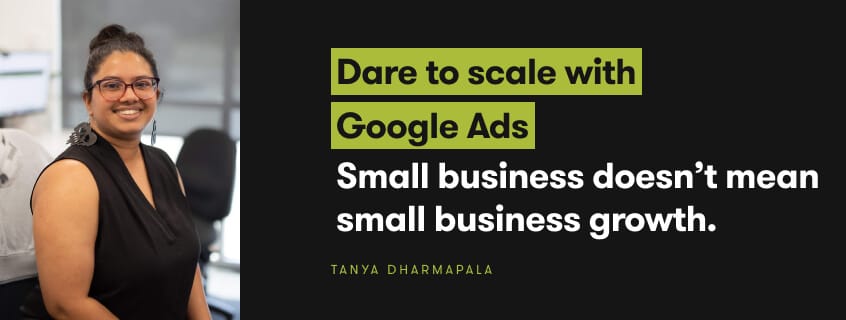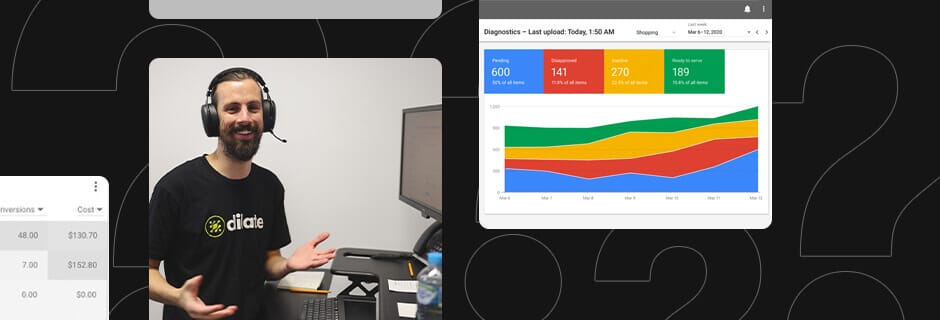

Pay-per-click. Either the most exciting or daunting thing you'll ever take on. The big question is, do Google Ads work for small business growth?
Well, if you just throw cash at it, and hope the unbeatable, all-knowing King of the Internet will sell for you, then no. But, with the right strategy and tools, this can be a fantastic opportunity for businesses of all sizes. And we're going to show you how.
We get it. Big businesses can afford to throw money at paid ads over and over until something sticks. But small businesses don't have that luxury. So, why take the risk?
We can't just say yes, so let us show you instead.
Imagine you're a local tour company. You sell small tour packages at an average sale value of $300. It's a highly competitive industry and the clicks are a little costly.
eCommerce websites have an average conversion rate of 2.7%. So, that's:
That's $7 made for every $1 you spend. Sounds pretty good right? But let's say you've done a bang-up job on your site and it's converting at a casual 7.5%. Now you've got:
A ROAS of over 20X? Yes please! Is that realistic, you ask? Absolutely! We know because that's our tour client, based right here in WA, smashing their goals with a well-designed PPC strategy. Ready for your own incredible results? Let's talk about what makes Google Ads such a good opportunity.

If you like to get your hands dirty, Google ads management is for you. You can enjoy control over everything, from the amount you bid on every single keyword to what position your ad headlines show up in. You can also use negative keywords to decide when your ads shouldn't show, determine what placements Google Display ads show up on, and so much more. The perfect platform for maximising your budget.
Talking about spend and getting more out of your Google Ads costs, it's also just price-efficient. As a pay-per-click advertising platform, you don't pay till someone clicks, and you can control the average CPC (a little marketing acronym that means cost-per-click) with bidding and cost caps. If you're looking for ROI and not too concerned about search volume, there's a lot you can do to control your costs.
It's an unbelievably powerful thing to be there just when someone needs you. And that's what Google ads offers. When someone is searching for exactly what you sell, with a very relevant keyword, you can put a really solid ad in front of them and convince them to take action. Talk about right place, right time!
Not only can business owners target people based on where they are, but also on areas of interest and areas they've been - whatever makes sense for your business. Local businesses can also tap into Google Business Profile and Google Maps ads to create a holistic experience around that target location and make it easier for potential customers to visit the physical store.
Google Ads itself offers some really juicy insights, and it's heavily centred around precision. You can even get an idea of exactly how much your ads contributed to a sale or lead in the overall buyer journey with position-based attribution. Plus it integrates with Google Analytics to allow you to import goals over, create audiences based on your website traffic, understand page engagement on the landing pages from your ads and so much more.
The opportunity in Google Ads for small business is a no-brainer. But does it really work for all small businesses?
There are three things you have to ask yourself, as advised by Google themselves.
Of course, if it was as easy as setting up some ads and hitting go, everyone would be doing it. We won't lie to you, there's a lot you have to do to actually run things properly, and get the most out of Google Ads. Small businesses especially don't have money to waste, so here are 10 things you should do to give your PPC campaign its best chance.
Google Ads is a beast of an undertaking. But as long as you know who you want to reach, what you want to sell and what they are looking for, you've got an amazing chance to get in front of the right people at the right time.
All it takes is the right mindset and strategy.
But if it's a bit too much, we get it. There's barely enough time in the world to come up with smart digital marketing campaigns, let alone fiddle with the many levers of Google Ads. Especially for a small business.
That's what we're here for. As PPC ad specialists, we'll scale and grow your business with paid ads, taking the guesswork out of optimisation and keeping our eye on the ball so you don't have to. If you'd like to jump on this massive opportunity without the stress, speak to the experts at Dilate Digital today.

Proudly wearing our Google Premier Partner status, we've been able to work closely with expert Google professionals to help hundreds of clients across industries build their businesses with well-designed ads. Our partnership with Google allows us to tap into exclusive resources and insights, staying ahead of the game in this competitive arena, so you can enjoy better performance and greater peace of mind. To get started, jump on a call with us today or send through an enquiry.
what our clients are saying
create business. better everyday.
Let's Talklearn from the best minds in the business
Bodie provides some insight into Dilate's internal operations. How we approach what we do, and how we strive to be Better Everyday.





